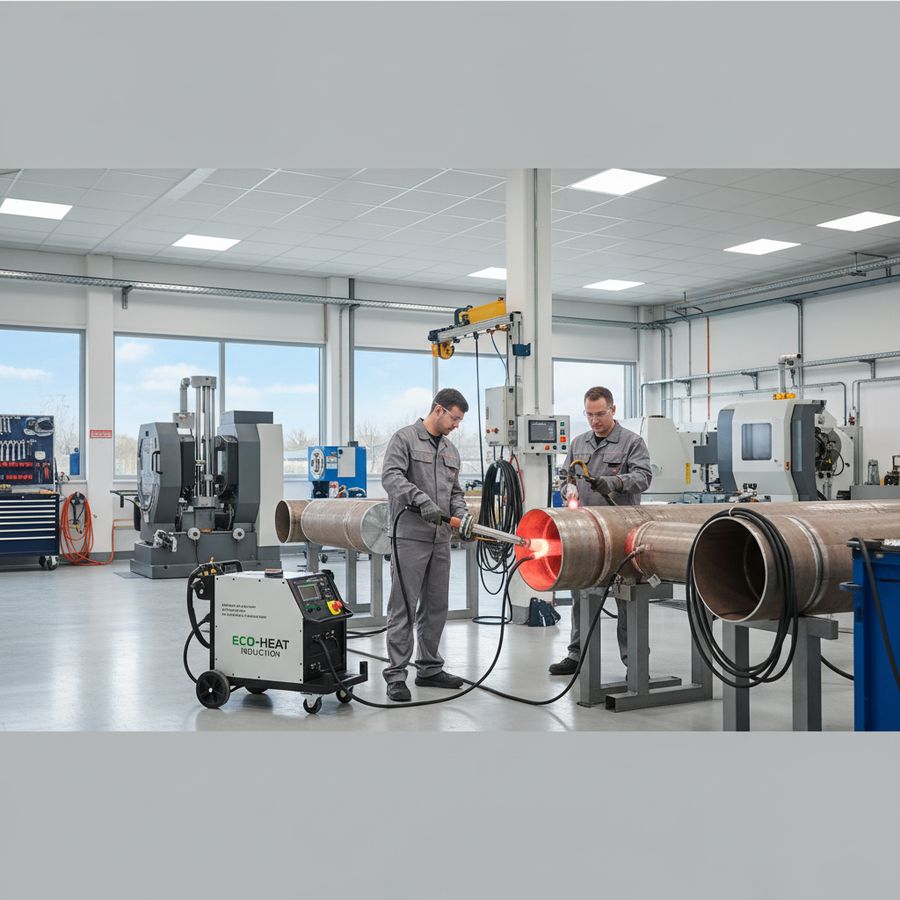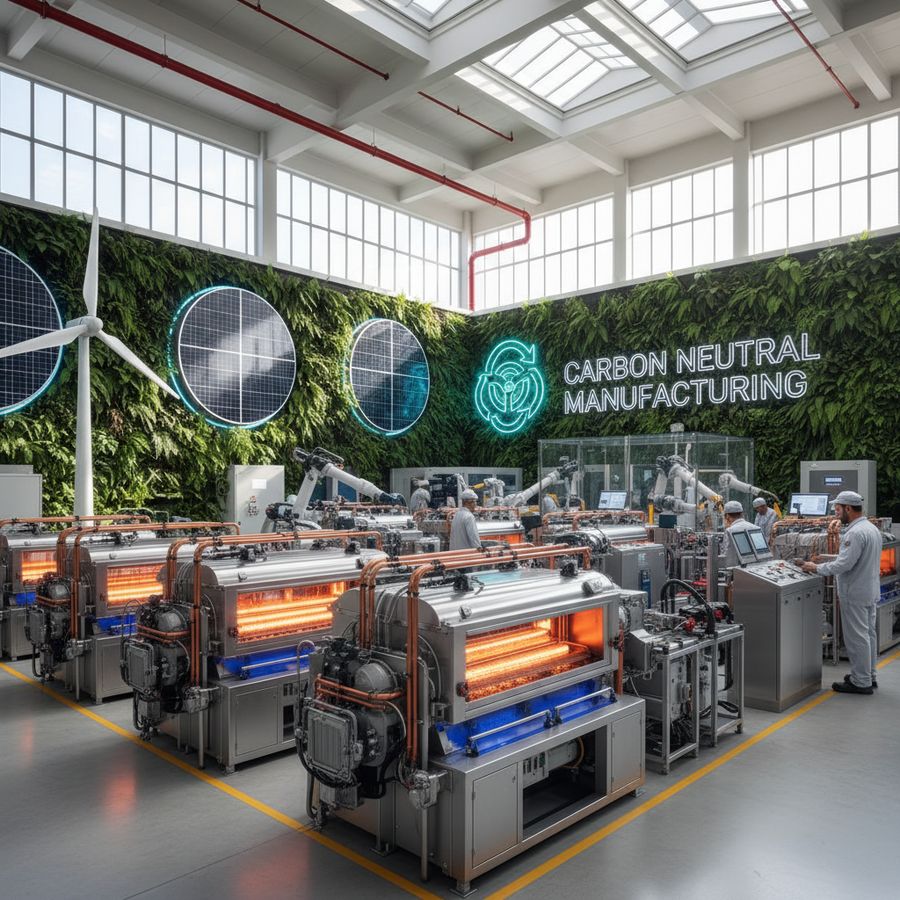The environmental advantages of induction heating technology
by Mikael Rosvall on Nov 20, 2025

Overview
Induction heating technology represents a significant advancement in the field of industrial heating, offering an innovative approach with remarkable environmental benefits. Unlike traditional heating methods that rely on open flames or fossil fuels, induction heating uses electromagnetic fields to heat metal objects directly and efficiently. This contactless heating process reduces energy waste and enhances precision, making it an increasingly popular choice among industries committed to sustainable practices.
From automotive repair shops to heavy manufacturing, induction heating has proven to be a game-changer. It is particularly effective for tasks such as releasing mechanical joints, heat alignment, and pre/post-welding treatments. By focusing heat exactly where it is needed, induction heating eliminates unnecessary energy consumption and minimizes environmental impact.
Moreover, induction heating is aligned with the growing global emphasis on reducing carbon footprints and promoting eco-friendly heating solutions. It supports operational efficiency while fostering a safer and cleaner work environment. This technology exemplifies how innovation can harmonize industrial productivity with environmental responsibility, making it a vital component in the pursuit of a greener future.

Carbon neutral heating
Carbon neutral heating is a critical goal in combating climate change, and induction heating technology is a powerful tool in achieving this objective. Unlike conventional heating methods that burn fossil fuels and emit carbon dioxide (CO2), induction heating operates with electrical energy, which can be sourced from renewables, thereby making the process carbon neutral.
By eliminating the need for gas or other combustibles, induction heating produces no direct emissions during operation. This is a substantial advantage for industries aiming to meet strict environmental regulations and corporate sustainability targets. In addition, the high efficiency of induction heating means less energy is consumed overall, further reducing indirect emissions associated with electricity generation.
Industries adopting induction heating technology contribute to the global effort to decarbonize industrial processes. This shift not only helps in lowering greenhouse gas emissions but also supports cleaner air quality and a healthier environment.
"The Alesco Induction Heating process is 100% CO2 neutral—no gas needed—making it an environmentally responsible choice for modern industry."

Reduction of CO2 emissions
Emission reduction is a pivotal aspect of environmental sustainability, and induction heating technology excels in this area. Traditional heating methods typically involve burning gas or fuel, which releases significant amounts of CO2 and other pollutants. In contrast, induction heating uses electromagnetic fields to heat metals directly, which drastically reduces the carbon footprint.
Because induction heating does not rely on combustion, it inherently avoids the release of harmful gases. This translates to cleaner operations and a marked decrease in greenhouse gas emissions. The reduction of CO2 emissions is not only beneficial for the environment but also helps businesses comply with increasingly stringent emissions regulations.
Furthermore, induction heating's rapid and precise heating capabilities minimize energy consumption. This efficiency means less demand on power plants, many of which still rely on fossil fuels, resulting in a lower overall environmental impact.
-
Eliminates combustion-related CO2 emissions
-
Reduces energy consumption through targeted heating
-
Supports regulatory compliance for emission standards
-
Enhances corporate sustainability efforts
Adopting induction heating technology is a proactive step toward a cleaner, more sustainable industrial future.
No gas or flames
One of the most notable environmental and safety advantages of induction heating is that it requires no gas or open flames. Traditional heating techniques often involve burning fuel, which not only emits pollutants but also poses significant fire hazards. Induction heating, by contrast, employs high-frequency electromagnetic fields to generate heat directly in the metal object, eliminating the need for combustible materials.
This flame-free operation significantly reduces the risk of workplace fires and explosions, contributing to a safer workshop environment. Additionally, the absence of gas means no emissions of dangerous gases like carbon monoxide or nitrogen oxides, which are common byproducts of combustion.
Without open flames, induction heating also prevents accidental damage to surrounding materials, such as paint or insulation. This not only enhances safety but reduces waste and the need for additional repairs or replacements, which indirectly benefits the environment.
"No gas and no flames mean a cleaner, safer work environment with lower environmental impact."
Safer work environment
Induction heating technology significantly enhances workplace safety compared to traditional heating methods. The elimination of open flames and combustible gases drastically reduces fire risks, creating a safer workshop environment for employees. This is especially important in heavy maintenance and automotive repair settings where flammable materials may be present.
In addition to fire safety, induction heating offers precise control over heating zones, minimizing accidental overheating or burns. The lightweight and portable design of modern induction heaters ensures ease of use and reduces physical strain on workers, promoting ergonomic benefits.
Lower insurance costs are often an added benefit as well, since the reduced risk of fire and accidents translates to fewer claims and liabilities. Employers can therefore invest in induction heating technology to not only protect their workforce but also optimize operational costs.
-
Eliminates fire and explosion hazards
-
Provides precise and controlled heating
-
Reduces physical strain with lightweight equipment
-
Contributes to lower insurance premiums
By prioritizing safety alongside efficiency, induction heating supports a responsible and sustainable industrial culture.
Long-term environmental impact
The long-term environmental impact of adopting induction heating technology is substantial and positive. By replacing gas-based and flame-based heating methods with induction, industries can achieve ongoing reductions in carbon emissions and energy consumption. This contributes to global efforts against climate change over time.
Induction heating equipment is designed for durability and long service life, which reduces waste by minimizing the need for frequent replacements. The contactless heating process also prevents damage to materials, reducing scrap and conserving resources.
Furthermore, the ability to integrate induction heating with renewable energy sources enhances its sustainability profile. As electrical grids become greener, the environmental benefits of induction heating will only increase.
"Induction heating is not just a short-term solution; it is an investment in a sustainable industrial future with lasting environmental benefits."
By transitioning to induction heating, industries embrace a clean, efficient, and responsible technology that aligns with the demands of environmental stewardship and corporate responsibility.
Conclusion
In conclusion, induction heating technology offers a transformative solution for industries seeking to improve their environmental performance while maintaining operational efficiency. Its carbon neutral heating capabilities, significant reduction in CO2 emissions, and elimination of gas and flames make it a truly eco-friendly heating method.
Beyond environmental advantages, induction heating enhances workplace safety by creating a safer workshop environment free from fire hazards. The technology’s efficiency and durability promise long-term benefits both economically and ecologically.
As industries increasingly prioritize sustainability, induction heating stands out as a reliable, innovative, and responsible choice. Embracing this technology not only supports environmental goals but also drives safer and more productive industrial processes.
"Switching to induction heating is a crucial step toward a greener, safer, and more efficient industrial future."




